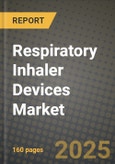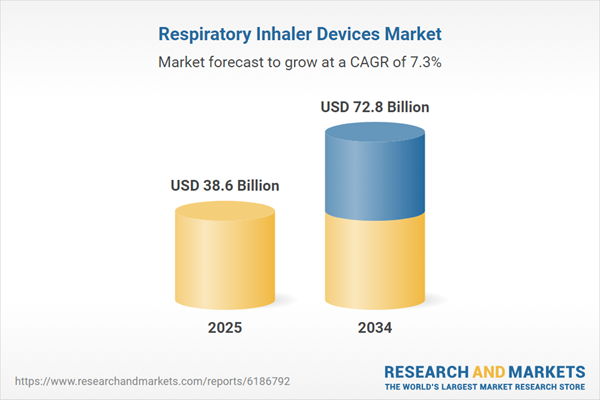The Respiratory Inhaler Devices Market is a vital segment within the global respiratory care industry, designed to deliver medication directly to the lungs for treating conditions such as asthma, chronic obstructive pulmonary disease (COPD), and other respiratory disorders. Inhalers offer rapid symptom relief and efficient drug absorption, with various types including metered-dose inhalers (MDIs), dry powder inhalers (DPIs), and soft mist inhalers (SMIs). The market is driven by the rising prevalence of chronic respiratory diseases, increasing air pollution levels, smoking habits, and growing awareness of early treatment. Inhaler technology has evolved to include user-friendly devices, digital adherence trackers, and improved drug formulations that ensure consistent dosing. With a growing global patient population, both developed and emerging economies are witnessing rising adoption of inhaler therapy across all age groups, further supported by physician recommendations and government respiratory health programs.
The respiratory inhaler devices market experienced significant advancements in design and digital integration. Major pharmaceutical players focused on improving inhaler accuracy, ease of use, and treatment adherence through smart inhalers equipped with Bluetooth and app-based monitoring. These devices allowed patients and healthcare providers to track medication usage and receive real-time feedback. Dry powder inhalers gained popularity due to their breath-actuated mechanism, especially among pediatric and elderly patients. The growing emphasis on sustainability led to the introduction of eco-friendly inhalers with reduced propellant emissions, particularly in Europe where regulatory pressure on hydrofluoroalkane (HFA) usage intensified. Emerging markets like India, Brazil, and Southeast Asia saw increased inhaler distribution through public health programs addressing underdiagnosed asthma and COPD. Innovations in combination inhalers, offering both maintenance and rescue medications in a single device, also gained regulatory approvals, improving therapy convenience and outcomes across patient groups.
The respiratory inhaler devices market is poised for further growth through advanced personalization, automation, and digital health integration. AI-powered inhalers capable of adjusting dosage based on symptom tracking or biomarker readings are likely to emerge. Continued investment in telemedicine infrastructure will support remote prescription management and monitoring of inhaler use, boosting patient compliance. The market is also expected to see increased development of sustainable inhaler propellants and recyclable device components in response to growing environmental concerns. Inhaler manufacturers will focus on expanding access in underserved regions by introducing cost-effective, easy-to-use inhalers suited for low-resource healthcare settings. Furthermore, clinical trials will explore inhalers as delivery systems for biologics and vaccines, expanding their therapeutic application. However, concerns over inhaler misuse, improper technique, and lack of training - especially among first-time users and elderly patients - remain a key challenge to achieving optimal therapeutic outcomes.
Key Insights: Respiratory Inhaler Devices Market
- Smart inhalers with Bluetooth connectivity and mobile app integration are improving medication adherence and real-time disease management.
- Eco-friendly inhalers with low-emission or alternative propellants are being developed to meet sustainability targets and regulatory compliance.
- Combination inhalers offering maintenance and rescue therapy in one device are gaining popularity for simplifying treatment regimens.
- Breath-actuated dry powder inhalers are preferred for their ease of use and suitability across age groups, especially children and elderly.
- Digital health platforms are enabling remote tracking of inhaler usage and supporting telemedicine-based respiratory care models.
- Rising prevalence of asthma, COPD, and allergic respiratory conditions is fueling continuous demand for fast-acting and preventive inhalation therapies.
- Technological advancements in device design and digital integration are enhancing treatment accuracy and user engagement.
- Government initiatives and healthcare programs are improving access to inhaler devices in emerging markets with growing disease burden.
- Increased focus on patient education and early diagnosis is expanding the treated population and encouraging long-term inhaler usage.
- Improper inhaler technique and lack of user training, especially among first-time users, hinder treatment efficacy and lead to poor disease control, highlighting the need for improved education and device design standardization.
Respiratory Inhaler Devices Market Segmentation
By Product
- Dry Powder Inhalers
- Metered Dose Inhalers
- Nebulizers
By Technology
- Manually Operated Inhaler Devices
- Digitally Operated Inhaler Devices
By Disease Indication
- Asthma
- Chronic Obstructive Pulmonary Disease
- Pulmonary Arterial Hypertension
- Other Indications
By End User
- Hospitals and Clinics
- Respiratory Care Centers
- Other End Users
Key Companies Analysed
- Merck & Co. Inc.
- Novartis AG
- AstraZeneca PLC
- Gerresheimer AG
- GlaxoSmithKline PLC
- 3M
- Boehringer Ingelheim International GmbH
- Koninklijke Philips N.V.
- Viatris Inc.
- Teva Pharmaceutical Industries Ltd.
- Catalent Inc.
- Perrigo Company PLC
- AptarGroup Inc.
- Recipharm AB
- Chiesi Farmaceutici S.p.A.
- Cipla Limited
- Hikma Pharmaceuticals PLC
- Zydus Lifesciences Limited
- Lupin Limited
- Glenmark Pharmaceuticals Ltd.
- Orion Corporation
- Sumitomo Pharma America Inc.
- Beximco Pharmaceuticals Ltd.
- Hovione Limited
- Vectura Group Limited
- H&T Presspart Manufacturing Ltd.
- Pari Medical Holding GmbH
- OMRON Healthcare Europe B.V.
- Medisol Lifescience Pvt. Ltd.
- Consort Medical plc.
Respiratory Inhaler Devices Market Analytics
The report employs rigorous tools, including Porter’s Five Forces, value chain mapping, and scenario-based modeling, to assess supply-demand dynamics. Cross-sector influences from parent, derived, and substitute markets are evaluated to identify risks and opportunities. Trade and pricing analytics provide an up-to-date view of international flows, including leading exporters, importers, and regional price trends.Macroeconomic indicators, policy frameworks such as carbon pricing and energy security strategies, and evolving consumer behavior are considered in forecasting scenarios. Recent deal flows, partnerships, and technology innovations are incorporated to assess their impact on future market performance.
Respiratory Inhaler Devices Market Competitive Intelligence
The competitive landscape is mapped through proprietary frameworks, profiling leading companies with details on business models, product portfolios, financial performance, and strategic initiatives. Key developments such as mergers & acquisitions, technology collaborations, investment inflows, and regional expansions are analyzed for their competitive impact. The report also identifies emerging players and innovative startups contributing to market disruption.Regional insights highlight the most promising investment destinations, regulatory landscapes, and evolving partnerships across energy and industrial corridors.
Countries Covered
- North America - Respiratory Inhaler Devices market data and outlook to 2034
- United States
- Canada
- Mexico
- Europe - Respiratory Inhaler Devices market data and outlook to 2034
- Germany
- United Kingdom
- France
- Italy
- Spain
- BeNeLux
- Russia
- Sweden
- Asia-Pacific - Respiratory Inhaler Devices market data and outlook to 2034
- China
- Japan
- India
- South Korea
- Australia
- Indonesia
- Malaysia
- Vietnam
- Middle East and Africa - Respiratory Inhaler Devices market data and outlook to 2034
- Saudi Arabia
- South Africa
- Iran
- UAE
- Egypt
- South and Central America - Respiratory Inhaler Devices market data and outlook to 2034
- Brazil
- Argentina
- Chile
- Peru
Research Methodology
This study combines primary inputs from industry experts across the Respiratory Inhaler Devices value chain with secondary data from associations, government publications, trade databases, and company disclosures. Proprietary modeling techniques, including data triangulation, statistical correlation, and scenario planning, are applied to deliver reliable market sizing and forecasting.Key Questions Addressed
- What is the current and forecast market size of the Respiratory Inhaler Devices industry at global, regional, and country levels?
- Which types, applications, and technologies present the highest growth potential?
- How are supply chains adapting to geopolitical and economic shocks?
- What role do policy frameworks, trade flows, and sustainability targets play in shaping demand?
- Who are the leading players, and how are their strategies evolving in the face of global uncertainty?
- Which regional “hotspots” and customer segments will outpace the market, and what go-to-market and partnership models best support entry and expansion?
- Where are the most investable opportunities - across technology roadmaps, sustainability-linked innovation, and M&A - and what is the best segment to invest over the next 3-5 years?
Your Key Takeaways from the Respiratory Inhaler Devices Market Report
- Global Respiratory Inhaler Devices market size and growth projections (CAGR), 2024-2034
- Impact of Russia-Ukraine, Israel-Palestine, and Hamas conflicts on Respiratory Inhaler Devices trade, costs, and supply chains
- Respiratory Inhaler Devices market size, share, and outlook across 5 regions and 27 countries, 2023-2034
- Respiratory Inhaler Devices market size, CAGR, and market share of key products, applications, and end-user verticals, 2023-2034
- Short- and long-term Respiratory Inhaler Devices market trends, drivers, restraints, and opportunities
- Porter’s Five Forces analysis, technological developments, and Respiratory Inhaler Devices supply chain analysis
- Respiratory Inhaler Devices trade analysis, Respiratory Inhaler Devices market price analysis, and Respiratory Inhaler Devices supply/demand dynamics
- Profiles of 5 leading companies - overview, key strategies, financials, and products
- Latest Respiratory Inhaler Devices market news and developments
Additional Support
With the purchase of this report, you will receive:- An updated PDF report and an MS Excel data workbook containing all market tables and figures for easy analysis.
- 7-day post-sale analyst support for clarifications and in-scope supplementary data, ensuring the deliverable aligns precisely with your requirements.
- Complimentary report update to incorporate the latest available data and the impact of recent market developments.
This product will be delivered within 1-3 business days.
Table of Contents
Companies Mentioned
- Merck & Co. Inc.
- Novartis AG
- AstraZeneca PLC
- Gerresheimer AG
- GlaxoSmithKline PLC
- 3M
- Boehringer Ingelheim International GmbH
- Koninklijke Philips N.V.
- Viatris Inc.
- Teva Pharmaceutical Industries Ltd.
- Catalent Inc.
- Perrigo Company PLC
- AptarGroup Inc.
- Recipharm AB
- Chiesi Farmaceutici S.p.A.
- Cipla Limited
- Hikma Pharmaceuticals PLC
- Zydus Lifesciences Limited
- Lupin Limited
- Glenmark Pharmaceuticals Ltd.
- Orion Corporation
- Sumitomo Pharma America Inc.
- Beximco Pharmaceuticals Ltd.
- Hovione Limited
- Vectura Group Limited
- H&T Presspart Manufacturing Ltd.
- Pari Medical Holding GmbH
- OMRON Healthcare Europe B.V.
- Medisol Lifescience Pvt. Ltd.
- Consort Medical PLC
Table Information
| Report Attribute | Details |
|---|---|
| No. of Pages | 160 |
| Published | October 2025 |
| Forecast Period | 2025 - 2034 |
| Estimated Market Value ( USD | $ 38.6 Billion |
| Forecasted Market Value ( USD | $ 72.8 Billion |
| Compound Annual Growth Rate | 7.3% |
| Regions Covered | Global |
| No. of Companies Mentioned | 30 |









